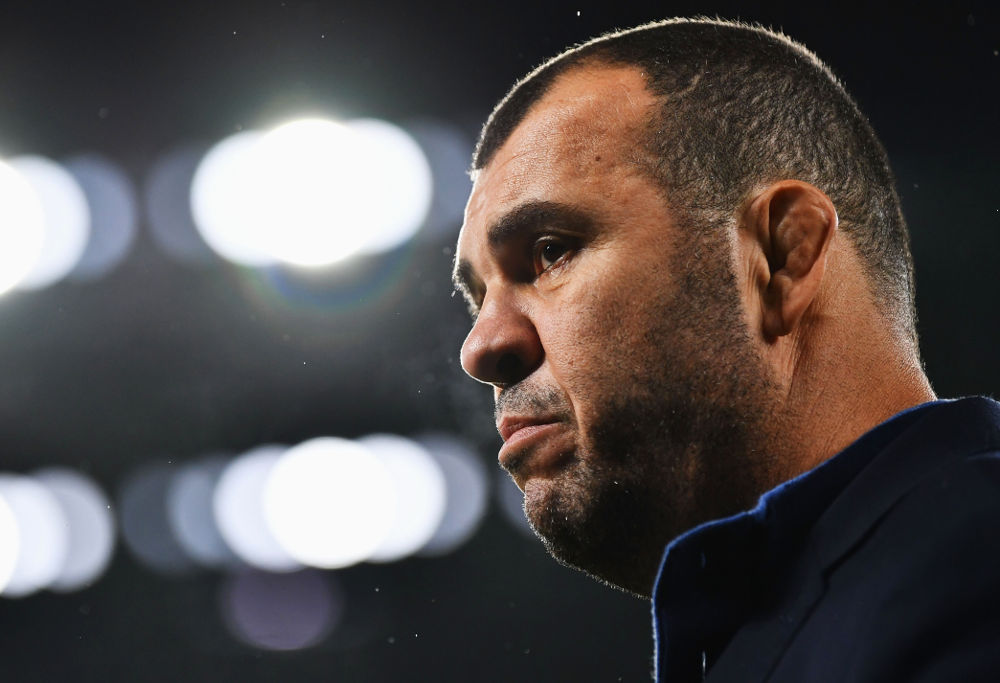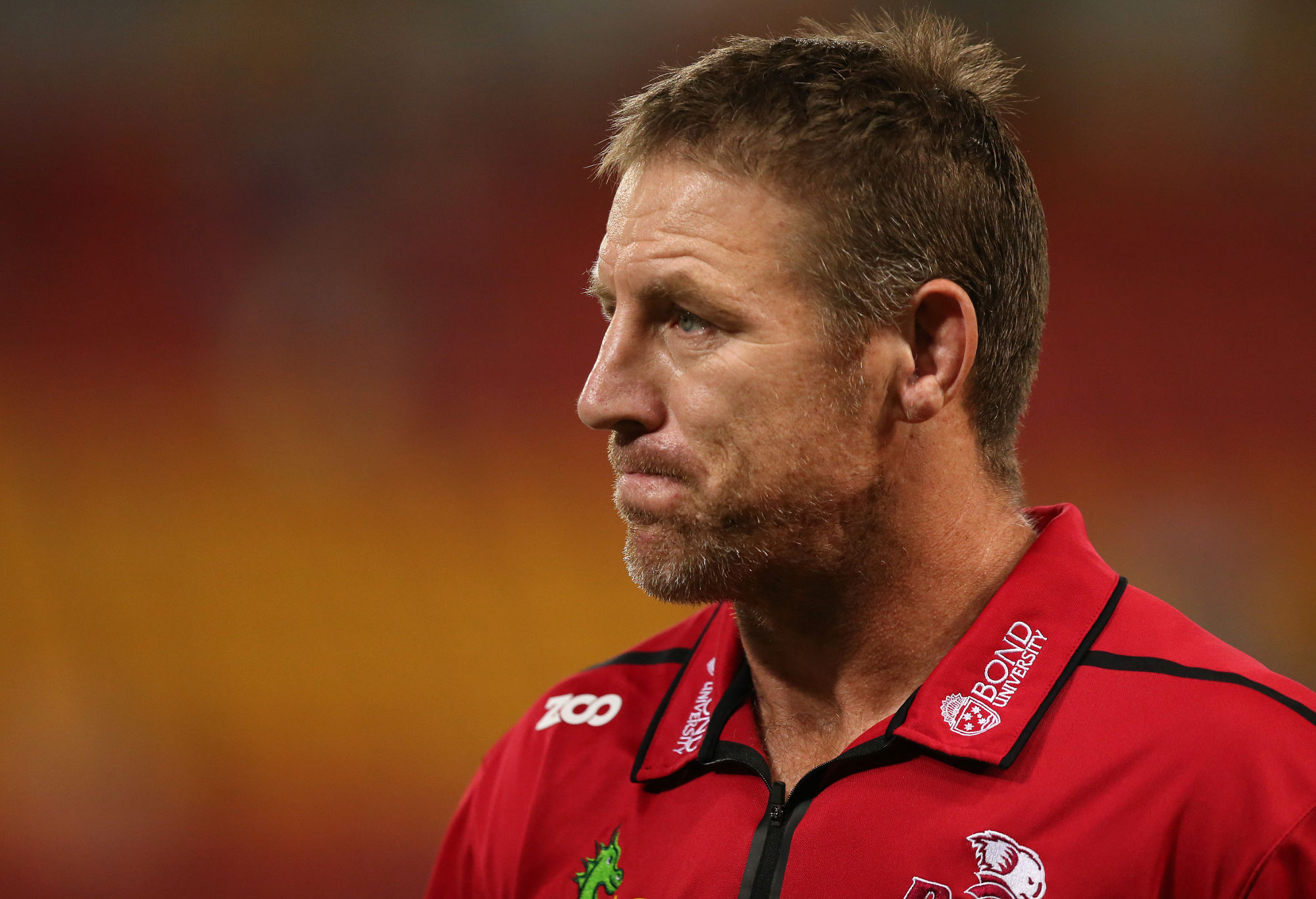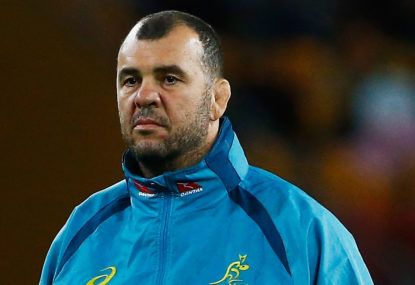The golden rule for selecting Test squads that will win rugby tournaments, especially the Rugby World Cup tournament, is to always put some growth into them.
This is why Michael Cheika is wrong, in my view, to try and bring back battered Wallabies hooker Tatafu Polota-Nau for the June series against Ireland.
Polota-Nau, even in his prime, could not command the undisputed first choice selection as the Wallaby hooker. His main problem was inaccuracy with his throwing, a core task for a hooker.
His tackling style, too, where he launches his head and shoulders at the ankles of the runner, is not only illegal (in my view), it also results in him being injured several times in most of the matches he plays.
Furthermore, and this is the crucial aspect, there are now a number of young hookers playing for Australian teams in the Super Rugby tournament who have gone past Polota-Nau in terms of value to the Wallabies moving forward to the 2019 Rugby World Cup.
As an example of this, here is Paul Cully in the Sydney Morning Herald, in an article titled ‘Thorn will turn Ballymore into the Wallabies factory‘, writing about Brandon Paenga-Amosa: “He is big and aggressive and strong in his core roles (particularly scrummaging) but he is also a footballer. He understands details such as pass selection and timing. He has been the outstanding hooker in Australia and it is shocking that he could have been a wasted talent before Thorn identified him and gave him a shot.”
The other Reds hooker, Alex Mafi, who started against the Sharks, scrummed very well, threw-in well and was handy around the field.
Over the weekend, too, a young and impressive hooker for the Rebels, Anaru Rangi, scored two tries off rolling mauls that were propelled forward by a pack that out-muscled the Sharks, a South African pack noted in the past for its physicality.
That accusation by Paul Cully about “wasted talent” applies, in my opinion, to Michael Cheika as much as it does to former Queensland Reds coaches.

(Photo by Dan Mullan/Getty Images)
Look, for instance, at the situation regarding halfbacks during Cheika’s reign as the Waratahs and now the Wallabies coach.
Cheika has, rightly, always championed Will Genia for the Wallabies. But he has consistently selected for the Waratahs and Wallabies as the back-up halfback the erratic Nick Phipps, a likeable, energetic player who is too often inclined to lose his accuracy in passing when pressure is applied.
In his younger days, Phipps had the potential to be a devastating running halfback. But somehow this aspect of his game slipped away.
The continued promotion of Phipps meant that a much better runner and passer, Jake Gordon, was not given the chances to develop his game under the pressure of a lot of game time.
And not only Gordon. When Gordon was unavailable last week for the Waratahs in their crucial match against the Melbourne Rebels, Mitch Short was given a chance to start at halfback.
Although he was carrying a ruptured ACL, Short played an outstanding game. His long, fast and accurate passing was instrumental in the Waratahs staging their remarkable second-half comeback to steam-roll their way to a famous victory.
Both Gordon and Short are talented players. Both of them are capable of playing well for the Wallabies. But their chances have been shortened by the tendency in Australian rugby, before Brad Thorn’s intervention, to prefer older, established players past their prime to younger potentially better players coming into their prime.
Paul Cully also suggests that Hamish Stewart (preferred by Brad Thorn to Quade Cooper) should be developed as the successor to Bernard Foley: “Stewart may be young but he’s a tough little character, with a kicking game that has more length than Bernard Foley.”
I would add, also, Jack Debreczeni to the list of possible successors to Foley. Debreczeni was outstanding for the Rebels in their brilliant demolition of the Sharks 46-14.
Caleb Timu, a try-scorer for the Reds against the Sharks, at the weekend is another player of talent identified by Cully as a potential Wallaby.
How Michael Cheika sorts of a back row that has size, youth and energy (epitomised by Timu’s play) when he clearly wants both Michael Hooper and David Pocock in his loose forward trio is a matter that will probably decide the success or failure of the Wallabies in the next Rugby World Cup.

(AAP Image/Dean Lewins)
Going back to the Rebels, their winning margin against the Sharks was the biggest in their history. One of the outstanding features of the way the Rebels played was the fluency of the backs and the variety and cunning of the set moves, all orchestrated brilliantly by Debreczeni.
I have always liked the story about Dan Carter and his first interview with the coach of the Crusaders, Robbie Deans.
“What are your goals this season?” Deans asked the youngster.
“To take Mehrts’ position off him,” Carter replied.
“Good answer,” Deans told him.
The story highlights the ruthlessness of New Zealand rugby, and its obsession to promote young talent. And while this story reflects well on Carter’s ambition to be the best player he could be, it reflects even better, I would argue, on Deans.
Here was a coach encouraging a youngster to play one of his favourite players out of his leading position.
Does Michael Cheika ask his young players the Deans question? And if he does, does he accept the Carter reply?
It seems to me, that there is too much favouritism endemic within the coaching staffs of senior Australian provincial and international rugby teams.
Paul Cully’s point about the “shocking” waste of talent perpetrated by the Queensland Reds coach can be applied, I would suggest, Michael Cheika and all the Super Rugby coaches in the last few years.
Why would the Brumbies under Stephen Larkham, for example, import an Argentinian halfback when NSW club rugby (to take only one state) is full of potentially very good half-backs?
By keeping to the old and failed stalwarts and making incumbency a permanent sinecure, the Super Rugby coaches in the past were entrenching a permanent mediocrity.
Thankfully that is changing with Dave Wessels and Brad Thorn, the coaches of the Rebels and Reds.

(Photo by Jono Searle/Getty Images)
But has Michael Cheika learnt the lessons they are teaching him?
I have argued for many years that the coaching staff of the Wallabies must include a senior figure in Australian rugby to be one of the selectors.
The All Blacks have benefited for some years with Grant Fox as a designated selector, outside of the coaching staff.
Under Cheika’s erratic selection regime, the need for such an outside appointment has become even more important.
And for the sake of discussion, I nominate Bob Dwyer, one of the two Wallabies coaches (along with Rod Macqueen) to win a Rugby World Cup tournament.
Bob Dwyer made one of the great selection calls of all time, in my view, in 1990 when he plucked Phil Kearns from Randwick second grade to play in a vital series against the All Blacks. The hooker who was the favourite to be selected was the Randwick first-grader, Eddie Jones!
The cautious Cheika needs someone like Dwyer to challenge him into being more creative with his selections.
And another thought comes to me from the Kearns bombshell selection. Perhaps it was this experience of being rejected in favour of his younger (and much bigger) understudy that has made Jones such an uninspired selector in his current coaching job with England. He tends to select older players rather than young up-and-comers.
Since he took over as coach after England’s total failure in Rugby World Cup 2015, Jones has experienced an unparalleled run of success until it came to a screeching halt with three successive losses in the team’s last three Six Nations Tests in 2018.
Now we have his biggest boosters (in the past) like Mick Cleary of the UK Daily Telegraph saying rude things like this: “Eddie Jones has gone from messiah to the man with his finger in the dyke as the water comes pouring through.”
We bring in the wisdom of the ancient Greeks at this point. Aristotle, the pragmatist philosopher, was the first thinker to articulate the importance of the life cycle in our understanding of how we behave and think.
Eddie Jones kept together a team that failed at its biggest challenge in the Rugby World Cup 2015 tournament and managed to revive it for a year or so with savage (verbal) spraying. But, to continue the gardening metaphor, Jones needed to do some equally savaged pruning.
With the pruning comes the green shoots and another cycle of growth.
Michael Cheika faces the same sort of dilemma – and opportunity – with his Wallabies squad for 2018. In this context, the obsession with clinging to players past their best days, like Tatafu Polota-Nau, is not a good omen.
































































































